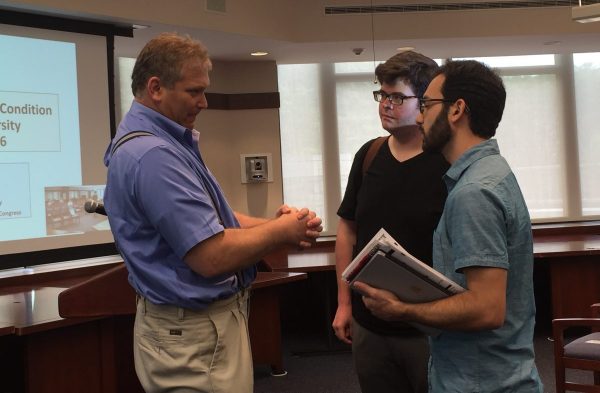Faculty Senate Forum Analyzes Fordham Finances
Graduate students, Steven Payne (left) and Alex Elnabli (right) speak with Bunsis. (ELIZABETH LANDRY/THE OBSERVER)
September 29, 2016
Howard Bunsis, Ph.D., J.D., of Eastern Michigan University joined the Fordham University Faculty Senate as a representative of the American Association of University Professors (AAUP) on Sept. 23 to talk about the university’s finances. The forum follows the imposition of an unnegotiated salary raise by the administration as the Senate considers legal action against the administration.
Faculty Senate President Anne Fernald, Ph.D. introduced Bunsis, reminding the assembled faculty of the situation.
Bunsis took the audience through his analysis of the university’s financial decisions and broke down the revenue streams, showing that the portfolio went from $450,000,000 to $720,000,000 in the last eight years.
He collapsed the university’s investments into three categories, which consisted of cash in government securities, stocks and bonds, and the riskiest investments like non-public equity funds, hedge funds and private equity funds. “I’m not saying it’s Bernie Madoff,” he quipped, to the audience’s laughter.
“Over time, they’ve moved more and more of the portfolio into these riskiest investments,” he said. He showed a graph which used the school’s audited statements to reveal that for the last six years, Fordham’s investments have consistently performed below the stock market, while the school has paid its financial advisors a steadily increasing rate.
Bunsis estimated that with different investments, the university would have gained possibly $10,000,000 to $20,000,000 more since 2010.
Bunsis answered audience questions, saying that 72 percent of the school’s revenue is made up of student tuition and fees. “The auxiliaries—housing, dining, student union, bookstore, I hate to say athletics, are tied to tuition,” he continued, “so I think it’s fair to say that eighty-five percent of the revenue is direct from students. And that is high for a private university of this size.”
He also showed the audience where Fordham’s administration and faculty salaries fall in comparison with their peers and with inflation. Of faculty salaries, he said, “This is paying people to teach as a percentage of the whole [revenue.] The public thinks that’s 90 percent.” The numbers on his slide showed it to be consistently about three percent of the university’s funds.
“The percentage of salaries of people who teach is going down, the percentage of the salaries of the admins are going up,” he said. “You tell me whether you think that’s okay or not.”
Bunsis urged the attendees to speak against the administration. “You have a mechanism to speak formally with the administration,” he said. “The way to work with it is to act collectively. You can’t have a union here… but you can act like one. A couple of people talking and complaining doesn’t do it. You care about this place, you guys are here forever.”
“You’re not acting collectively to take anything down, you’re acting collectively to make it better,” he said. “To enhance the commitment to these students. The ones who do the most get paid the worst. And that’s unfortunate..”
Audience questions ranged from closer looks at the cost of living and inflation rates in New York, and an examination of the decline in tenured professor acquisition, and a 63 percent change in part-time faculty over the last eight years.
Professor Andrew H. Clark, Ph.D. and Chair of Faculty Salary and Benefits Committee, closed the meeting with a plea to Senate members to donate to the Fordham AAUP chapter and get involved with the legal proceedings












